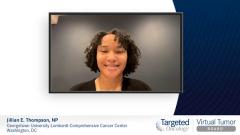
NSCLC: Factors in Selecting 2L Therapy After Progression on 1L ALK TKI
Expert perspectives on factors that aid in the selection of optimal therapy for patients with relapsed/refractory ALK+ non–small cell lung cancer.
Episodes in this series

Transcript:
Stephen Liu, MD: If we go back to our case, the patient progressed on alectinib, had a biopsy, and tissue was sent for NGS [next-generation sequencing]. Blood was drawn for ctDNA [circulating tumor DNA] ALK mutation testing. We saw the ALK fusion present—we don’t lose that—as well as the EML4-ALK G1202R and a PD-L1 of 25%. Jyoti, for ALK G1202R, what are we doing with that information?
Jyoti Patel, MD: Unfortunately, this patient has developed a mutation that makes them alectinib-resistant, essentially. The good news is that there are other drugs that are effective. Lorlatinib is, but there’s also evidence that brigatinib could be helpful for this patient.
Stephen Liu, MD: Jillian, do you agree that immunotherapy isn’t a consideration in this setting?
Jillian E. Thompson, NP: I agree. We talked about earlier about the risk of [INAUDIBLE] after the TKI [tyrosine kinase inhibitor].
Stephen Liu, MD: Ross, how are you managing the EML4-ALK G1202R?
Ross Camidge, MD, PhD: Jyoti already hinted that there’s some evidence for brigatinib and good evidence for lorlatinib. The exposure that brigatinib achieves is on the cusp of whether it can inhibit G1202R. You get these isolated cases of somebody responding and somebody not responding. If I have this in 1 of my patients, I reach for lorlatinib because its coverage is much more reliable for G1202R.
Stephen Liu, MD: Sounds like everyone is in alignment. This is a mutation that, when we see it, we set certain expectations for it. We’ve talked a bit about biopsy and ctDNA. Biopsy can tell us a little about histological change, although that’s less common in ALK. Maybe that’s because it’s not done as much. NGS can be done on ctDNA as well. You mentioned that Immunotherapy isn’t something we’re too excited about, Ross. Is there any role for immunotherapy in someone with an ALK fusion lung cancer?
Ross Camidge, MD, PhD: When we’re talking about immunotherapy PD-1 or PD-L1, the answer is no. There’s 1 recorded case in the entire world of an ALK patient unequivocally responding to a PD-1 or PD-L1 inhibitor, which makes it a Hail Mary.
Stephen Liu, MD: Jyoti, have you had any success in your own practice?
Jyoti Patel, MD: I haven’t, and I wouldn’t use it as monotherapy. There are some data with carboplatin, paclitaxel, atezolizumab, and bevacizumab. It’s a very small number of patients, but I’d likely use that approach after multiple lines of therapy.
Stephen Liu, MD: It sounds as if chemotherapy is much preferred over immunotherapy. But with the G1202R, lorlatinib does have some activity. There were several studies showing that in the setting of resistance mutations and solvent form mutations, lorlatinib is an effective agent. We talked a little about brigatinib being on the cusp of having activity. Lorlatinib is probably a little more established in that space, but if lorlatinib is not tolerated or not available, brigatinib could be active. Overall, our approach seems to be aligned in terms of our use of biopsy and potentially chemotherapy in this setting.
Let me change things a little. What if it was oligoprogression? Ross, explain what I mean by that.
Ross Camidge, MD, PhD: It’s a slightly made-up term. We made it up in 2012, but it means a small number of sites of progression. We started to see it in ALK patients before we saw it in EGFR. The idea that you were seeing most of the disease still controlled and only a few sites growing—1, 2, or 3. It was amazing when we first saw it. It was as if this was an evolution of clones going on in real time, and we were able to challenge the paradigm.
I spoke to my colleague Brian Kavanagh, who’s a radiation oncologist, and said, “Do you think we can zap this with radiotherapy and keep them on the drug?” He said, “Sure, why not?” So that’s what we did. When we did that, the median time to the next progression event was 4 or 5 months. If that was a PFS [progression-free survival] benefit from a new drug, everyone would shout about it, but this was just looking at the scans and thinking outside the box.
Stephen Liu, MD: Oligoprogression is focused with locally ablative therapy like stereotactic radiation. Is this something you’re doing in our practice as well, Jillian?
Jillian E. Thompson, NP: Yes. It’s definitely an option to remain on the TKI. If there’s some areas that we can target with the radiation and continue with the TKI, that’s what we do.
Stephen Liu, MD: It’s interesting to think of this divergent evolution where when we see progression. Even if it’s in 2 sites, it might be 2 totally different mechanisms. They might not be talking to each other, or maybe they are talking to each other, but it’s interesting to see more use of local therapy and staying on that treatment. Jyoti, is oligoprogression something you’re looking for? Is all resistance and all progression the same, or is there room for nuance?
Jyoti Patel, MD: There’s a lot of room for nuance if there’s other systemic control—it might be radiation, it might even be resection. Ross’s group has led efforts and consolidation for patients who’ve had a deep response but may have resistor cells that remain metabolically active or don’t respond the way we’d expect. That may be an avenue to intensify therapy for certain patients.
Ross Camidge, MD, PhD: It’s almost like a drug moving from later line to first line. Radiation is moving from an oligoprogressive to an oligoresidual disease setting.
Stephen Liu, MD: Studying that persistent population is something both of you have talked about quite a bit. It’s an important area. We’re running out of time, but I want to ask 1 quick question. Ross, I’ll start with you. In resected ALK-positive lung cancer—a stage IIIA microscopic adenopathy, resected, good margins—we deliver and complete adjuvant chemotherapy. Is there a role for targeted chemotherapy?
Ross Camidge, MD, PhD: Even though those studies are still ongoing, we can reliably predict that 2 to 3 years of an ALK-TKI, given in the adjuvant setting, will produce a disease-free survival advantage. I’ll bet my life on that. The question is, so what? I’ve become more sympathetic to the idea that a disease-free survival advantage is a benefit. If I said, “Steve, would you like to pay your taxes now or in 3 years?” most individuals would take me up on the second offer. It gives you time on a very human level to get your head around the disease. I still think there are nuances. Do we need to stop it? Can we find ways of saying you need to be on it forever? It will come. I don’t do it, but I’m sure it’s coming.
Stephen Liu, MD: Jyoti, do you have any thoughts there?
Jyoti Patel, MD: Patients with stage III disease have an incredibly high risk of recurrence unfortunately. After chemotherapy, it’s not unreasonable to discuss whether a patient would want to go in a targeted therapy with all the caveats that we’re making inferences from osimertinib adjuvant therapy. We don’t duration, and we will not know OS [overall survival]. But for a young patient with high risk of occurrence, it’s OK.
Stephen Liu, MD: One more wrinkle. If someone is receiving an ALK inhibitor, and they progress. Maybe they’re moved to lorlatinib and then progress again. Now we’re going into chemotherapy. As all of you have mentioned, chemotherapy is an active, well-tolerated important part of treatment for a lot of patients with ALK-positive lung cancer. When we move to chemotherapy, what happens to the TKI? Jyoti, we’ll start with you and then go to Ross. TKIs with chemotherapy—no? Yes? Sometimes?
Jyoti Patel, MD: Sometimes. For patients with significant CNS [central nervous system] disease, sometimes I’ll start chemotherapy and then add the TKI back if that’s been controlling CNS disease in the past.
Stephen Liu, MD: [What about] tolerability?
Jyoti Patel, MD: I haven’t had as many issues with tolerability. I do it in a stepwise approach.
Stephen Liu, MD: Ross, what has your practice been?
Ross Camidge, MD, PhD: I view it as you’re controlling some disease. Almost as we did with oligoprogression, but rather than adding radiation, you’re adding chemotherapy. I tend to keep the TKI going for suppressing the disease, as Jyoti said, especially if it’s in the CNS. Can I prove it [works]? No.
Stephen Liu, MD: This has been a great discussion. I want to thank our panel for all their insights, for their thoughtful reflections and perspectives on treating ALK-positive non–small cell lung cancer. From the University of Colorado, Ross Camidge; from Northwestern University, Dr Jyoti Patel; and from Georgetown University, Jillian Thompson. To our audience, thank you for joining us for this Targeted Oncology™ Virtual Tumor Board® presentation. We hope today’s discussion was valuable and that you acquired practicalknowledge that can help you in your clinical practice. Thank you.
Transcript edited for clarity.





















